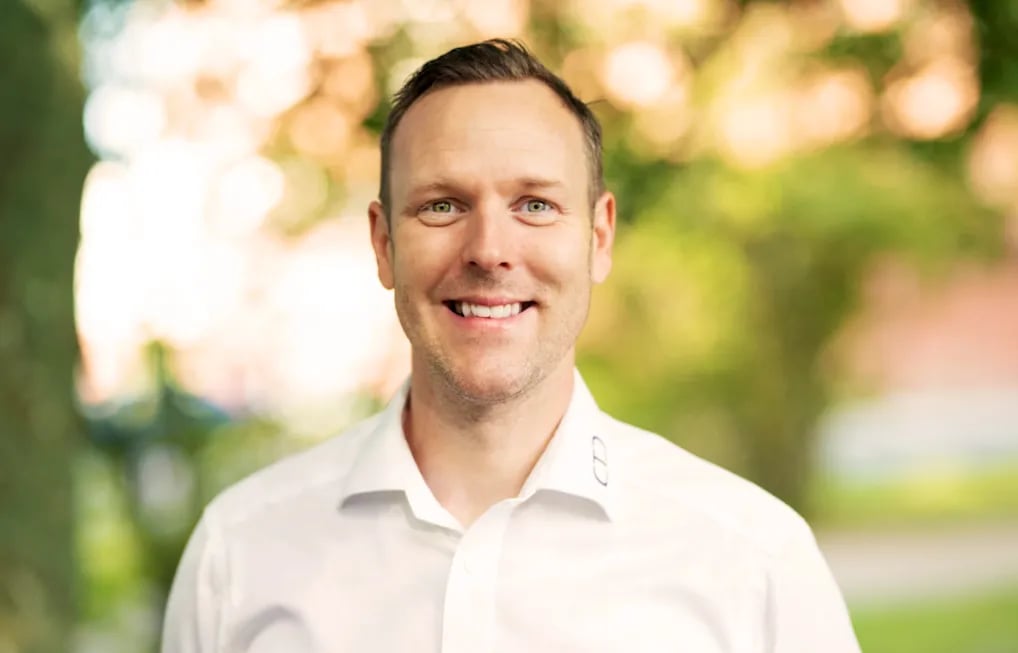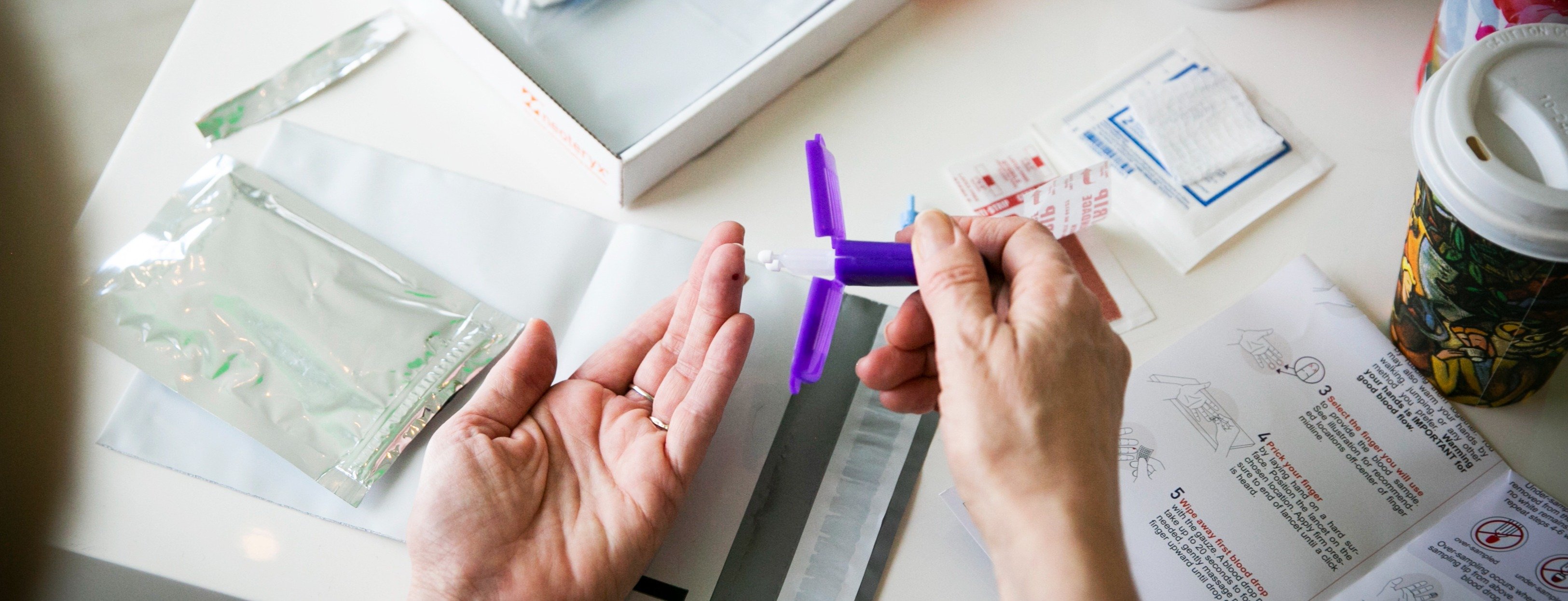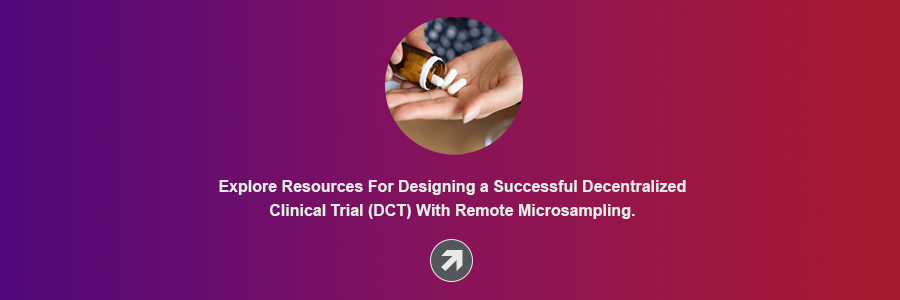Share this
virtual clinical trials and remote microsampling at CTC, Sweden
by Neoteryx Microsampling on Nov 9, 2023 9:00:00 AM

For our "Microsamplify Podcast" we spoke with Anders Millerhovf, the CEO and co-founder of a company in Sweden called Clinical Trial Consultants, or CTC. As its name might suggest, CTC helps pharmaceutical companies and clinical research organizations (CROs) implement effective research and clinical trials in Sweden.
CTC partnered with Neoteryx, the microsampling brand of Trajan Scientific and Medical, to offer remote blood sampling using the Mitra Blood Microsample Collection Kit to its customers, along with CTC's e-Solutions to help organizations more easily conduct virtual clinical trials and e-studies.
As Mr. Millerhovf explains, virtual capabilities improve convenience and efficiency in many telemedicine and tele-research scenarios, but “going virtual” has even greater implications today for clinical and research organizations operating in this era of superbugs and pandemics.
Neoteryx: Hello, Mr. Millerhovf. We’re excited to learn more about you and your company, Clinical Trial Consultants! Can you tell us a little about yourself and why you decided to co-found CTC?
Millerhovf: I am a positive entrepreneur with the belief that you will go far with a calm and positive attitude, regardless of what tasks you have in front of you. I also strongly believe that everyone wants to do a good job.
Being part of founding a company has always been a vision and career aspiration for me. I was waiting for the right opportunity as I gained experience working in early clinical studies. That opportunity emerged nine years ago. The idea of starting CTC came up after a discussion with some of my former colleagues at Berzelius Clinical Research Center (a Phase 1-2 clinical research unit in Linköping, Sweden) and Quintiles (a Phase 1 unit in Uppsala, Sweden). Both companies had closed their businesses that provided early clinical development in Sweden. We thought it was such a shame that so many years of experience in conducting early clinical studies and well-established working procedures would be lost.
Neoteryx: Your company is relatively young, yet it has become a major player in the Scandinavian CRO scene. In fact, you already coordinated at least one virtual clinical trial using e-solutions, and we understand you have plans to introduce a new app to the CRO market to further enable virtual clinical trials. Can you tell us more about that?
Millerhovf: CTC did its first virtual study 2018. In that study we focused on digital signatures using BankID (more than 84% of Sweden’s population uses BANKID) to sign the informed consent. We combined that with a mobile app software for virtual visits via video link. We also offered remote blood collection kits to study subjects, so they could participate from home. No physical visits were done. The study’s blood collection kit was sent via courier or could be picked up by the subjects at a local clinic.
This study was successful in many ways, but mostly in relation to subject recruitment. The entire population in Sweden could be accessed as the subject recruitment pool, and the patients did not have to travel to any clinic for their study visits. This accelerated the recruitment rate.
Neoteryx: It sounds like CTC’s first virtual clinical study using our Mitra devices and your e-solutions was quite successful.
Millerhovf: Yes, due to our success and positive experience with that first virtual study, we have been able to leverage the enormous potential that exists in virtual studies and take the next step. Our holding company, Center for Translational Research (CTR), has invested in a new sister company to CTC, ClinSmart Sweden. ClinSmart Sweden AB will build an infrastructure for Phase II to IV clinical trials with a strong digital and virtual focus. ClinSmart is developing a concept for Virtual Clinical Trials (VCTs), including an app supporting the virtual trial process even more.
Neoteryx: On the CTC website (www.ctc-ab.se), your company is described as providing full-service CRO services to other CROs that are running clinical trials, and to pharmaceutical companies that are conducting pre-clinical research. It looks like CTC has 4 departments covering roughly 8 service areas for its customers. Can you provide an overview of the different services that your company provides to help other organizations run clinical trials?
Millerhovf: CTC offers a true full-service package. We are one of the few CROs that conducts clinical trials in our own research units, with our own physicians, nurses, pharmacists and laboratory staff. We also have three other departments offering expertise, including Clinical Operations for project management, monitoring, medical writing and clinical trial administration; Pharmacovigilance for medical monitoring, safety reporting and medical coding; and Biometrics for data management, eCRF design, statistics and pharmacokinetics.
Having our own experts in-house is particularly important in early phases when it’s crucial to meet tight timelines and when flexibility is of utmost importance. Our broad spectrum of services attracts many different organizations both from the Pharma / MedTech industry, and from the CRO industry itself. Many CROs lack access to clinical research units and high recruiting SMOs in the Nordic countries. To widen our spectrum even more, last year our holding company acquired a top GLP bioanalysis lab, Lablytica AB. This lab will be responsible for the analysis of blood microsamples, and they will be a key component of our future virtual studies. They are already heavily involved in several of our human clinical studies, for which we have collected samples via microsampling.
Neoteryx: You serve many different types of companies/customers. Can you list the different types of customers you serve and explain how you adapt your expertise to their needs?
Millerhovf: Being flexible as a CRO is crucial. As our client base includes small, medium and large life science companies, and their needs vary greatly. Many of our smaller clients would like expert help in planning their clinical development programs and study design. We have several in-house clinical development experts and we work with select expert consultants who help us efficiently assist smaller clients.
To be able to meet each client very early on, our holding company has started a regulatory consultancy firm, RegSmart Life Science AB, with former staff from the Medical Products Agency in Sweden giving expert advice on regulatory strategies. Larger clients that have their own in-house experts have less need for our medical, scientific and regulatory advice. For these larger clients we share responsibilities according to their needs. Our role in collaborations with those clients can easily be distinguished based on our fully mapped processes.
Neoteryx: How will your new app/e-technology help you adapt in new ways to facilitate clinical research customers in going virtual?
Millerhovf: The concept and the app that ClinSmart Sweden AB are developing will facilitate subject recruitment, pre-screening with web-questionnaires, remote eConsent, video meetings, ePROs, integration with different data sources for data collection, remote microsampling, chat functions and all communication between the study subjects and study staff. There will also be modules for patient engagement. Both subjects and staff can use BankID for secure identification. These e-solutions are flexible to meet the customers' needs. Some or all visits and procedures in a study can be replaced by virtual counterparts, depending on the nature and safety aspects of the study.
Neoteryx: How will remote microsampling with the Mitra blood collection device facilitate virtual trials? Can you walk us through the process of how you use remote microsampling and e-technology together to coordinate a virtual trial?
Millerhovf: Microsampling can potentially be used for screening-purposes (to verify incl/excl criteria), for end-point data or to collect pharmacokinetic data. The blood collection kit will be shipped/delivered to the subject’s home or picked up at the study site or a dedicated lab/pharmacy.
The subject will use BankID for identification in the app and scan the barcode or qr-code on the sampling device for exact timepoint and identity of each sample. Then the samples will be shipped to the collaborating lab (our sister company Lablytica) for analysis.
Neoteryx: What are the advantages of running a virtual clinical trial vs. an onsite trial? Are we talking about significantly lower costs and a broader (more global) pool of study subjects?
Millerhovf: The major advantage of going virtual is that it makes it easier for patients to participate in clinical trials, which is very beneficial for recruitment. We can now recruit patients with disabilities, and those who live a great distance from a research unit or have diseases or conditions that might limit their ability to participate in an onsite trial.
Virtual studies minimize the number of physical visits to the units and could also potentially (as described in the example above) increase the population base for recruitment. The combination of less visits and faster recruitment is, of course, beneficial from a cost perspective. Additionally, a specimen microsampling approach in your virtual study keeps the number of costly dry ice shipments down.
Another advantage is that the site staff can work more effectively on the study. For example, if the consent is completed digitally before the first visit, then the study nurse can immediately start to work with the subject as soon as he or she arrives at the clinic.
In pandemic times as we all are experiencing now, a virtual study would be able to continue without increased risk of virus spread since the visits would be performed virtually.
Neoteryx: The advantage of reducing everyone’s exposure to contagions by replacing physical interactions with virtual interactions is certainly of increased importance now, as we grapple with a viral pandemic.
Where can people find out more about CTC and the new e-solutions and app you are launching to facilitate more virtual clinical trials?
Millerhovf: Visit our website at www.ctc-ab.se to learn more about CTC and the services that we provide or contact Anders Millerhovf, CEO (anders.millerhovf@ctc-ab.se). We are always happy to set up a videocall with interested clients.
Neoteryx: Thanks again, Mr. Millerhovf, for discussing the exciting work you and CTC are doing! We wish you much success with your evolving clinical trial and research study services!
Visit our decentralized clinical trials resource page to learn more about microsampling.
Image Credits: CTC Sweden, Trajan, Neoteryx
Share this
- Microsampling (206)
- Research, Remote Research (119)
- Venipuncture Alternative (105)
- Clinical Trials, Clinical Research (83)
- Mitra® Device (73)
- Therapeutic Drug Monitoring, TDM (51)
- Dried Blood Spot, DBS (39)
- Biomonitoring, Health, Wellness (30)
- Infectious Disease, Vaccines, COVID-19 (24)
- Blood Microsampling, Serology (23)
- Omics, Multi-Omics (21)
- Decentralized Clinical Trial (DCT) (20)
- Specimen Collection (18)
- Toxicology, Doping, Drug/Alcohol Monitoring, PEth (17)
- Skin Microsampling, Microbiopsy (14)
- hemaPEN® Device (13)
- Preclinical Research, Animal Studies (12)
- Pharmaceuticals, Drug Development (9)
- Harpera Device (7)
- Industry News, Microsampling News (5)
- Antibodies, MAbs (3)
- Company Press Release, Product Press Release (3)
- Environmental Toxins, Exposures (1)
- July 2025 (1)
- May 2025 (1)
- April 2025 (2)
- December 2024 (2)
- November 2024 (1)
- October 2024 (3)
- September 2024 (1)
- June 2024 (1)
- May 2024 (1)
- April 2024 (4)
- March 2024 (1)
- February 2024 (2)
- January 2024 (4)
- December 2023 (3)
- November 2023 (3)
- October 2023 (3)
- September 2023 (3)
- July 2023 (3)
- June 2023 (2)
- April 2023 (2)
- March 2023 (2)
- February 2023 (2)
- January 2023 (3)
- December 2022 (2)
- November 2022 (3)
- October 2022 (4)
- September 2022 (3)
- August 2022 (5)
- July 2022 (2)
- June 2022 (2)
- May 2022 (4)
- April 2022 (3)
- March 2022 (3)
- February 2022 (4)
- January 2022 (5)
- December 2021 (3)
- November 2021 (5)
- October 2021 (3)
- September 2021 (3)
- August 2021 (4)
- July 2021 (4)
- June 2021 (4)
- May 2021 (4)
- April 2021 (3)
- March 2021 (5)
- February 2021 (4)
- January 2021 (4)
- December 2020 (3)
- November 2020 (5)
- October 2020 (4)
- September 2020 (3)
- August 2020 (3)
- July 2020 (6)
- June 2020 (4)
- May 2020 (4)
- April 2020 (3)
- March 2020 (6)
- February 2020 (3)
- January 2020 (4)
- December 2019 (5)
- November 2019 (4)
- October 2019 (2)
- September 2019 (4)
- August 2019 (4)
- July 2019 (3)
- June 2019 (7)
- May 2019 (6)
- April 2019 (5)
- March 2019 (6)
- February 2019 (5)
- January 2019 (8)
- December 2018 (3)
- November 2018 (4)
- October 2018 (7)
- September 2018 (6)
- August 2018 (5)
- July 2018 (8)
- June 2018 (6)
- May 2018 (5)
- April 2018 (6)
- March 2018 (4)
- February 2018 (6)
- January 2018 (4)
- December 2017 (2)
- November 2017 (3)
- October 2017 (2)
- September 2017 (4)
- August 2017 (2)
- July 2017 (4)
- June 2017 (5)
- May 2017 (6)
- April 2017 (6)
- March 2017 (5)
- February 2017 (4)
- January 2017 (1)
- July 2016 (3)
- May 2016 (1)
- April 2016 (2)



No Comments Yet
Let us know what you think